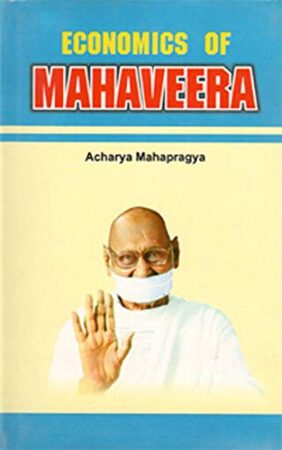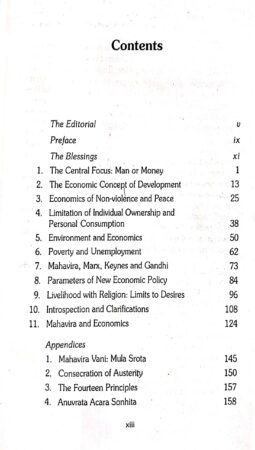
Economics of Mahaveera


About the Author
Being a poet along with being a philosopher is supposed to be a rare combination. Acharyashri Mahapragya is a great poet besides being a great philosopher. The literature written by Acharyashri Mahapragya is proving very effective like panacea in solving the horrible problems of the present age like—tension, lack of sensitivity, excitement, depression, terrorism, inferiority complex, hatred, fraud, immorality, lack of authenticity and absence of peace. In the books of Acharya Mahapragya, solutions of various problems have been given by way of experiments and training. His writings bring about an all-round development of one’s life and thus are rendering a great service to humanity. Mankind will forever be obliged to him for his contribution that he has made through his literature.
About the Book
A reading with rapt attention of the book is divided in 11 chapters and developed in 158 Pages with concise but informative outlines of the basic teachings of Mahaveera which are relevant to the real understanding of economics.
Lord Mahavira was born in the royal family of Bihar in 599 BC. His father’s name was king Siddhartha and mother’s name was queen Trishala. The divine child was called Vardhamana- which means continuously. The young boy was very bright and courageous lad who showed extraordinary skills at a very young age. Mahavira achieved enlightenment kevala-jnana on the 13th year of his ascetic life and therefore was latter called Mahavira (the name is from Sanskrit language Maha-great & Vira-hero). For all the readers, Bhagwan Mahaveera does not have the meaning of God but the term Bhagwan here means “one who is knowledgeable” and since Mahaveera achieved enlightenment kevala-jnana he is called as Bhagwan Mahaveera.
Mahaveer gave the ideas for human civilization, which are even today widely followed in India. These ideas are contrary to modern economic planning in many ways and therefore these ideas can help us in attaining sustainable development goals. While the present day economists encourage consumption just contrary to traditional Indian wisdom and ideas of Mahaveer, who asked for restraint on consumption and for adoption of care and caution in consumption. While present day economists believe that higher the consumption of goods and services, the better it would be, the ideas of Mahaveer are almost the opposite. The ideas of Mahaveer have been presented again in the present times by Acharya Mahapragya in the form of Relative Economics. Relative Economics is the branch of economics, which mentions the goals of economic planning.
Acharya Mahapragya (1920-2010) is well known saint and scholar in many fields like philosophy, meta-physics, religion, linguistics etc. His one of the most important contribution has been to raise our awareness about relative economics. His assertion that relative economics is the solution for the problems of tomorrow is the message for all economists and policy makers. Relative economics enables us to give a broader framework to our economic indicators. Relative Economics should definitely evolve from India only as this is a broader framework in comparison to the present day economic indicators. The present economic system looks at material resources and overall production as indicators of prosperity. Relative economics looks at the following issues:
a) the development of countries and regions should be studies not just on a few indicators, but on broader parameters.
b) impact of our policies on the overall happiness and overall well-being of people must be studied
c) impact of our acts on other living beings should also be noticed and we should go for a balanced development, with focus on sustainable development
d) impact of our plans and policies on the long term survival and sustainance of our planet.
Economics is the science and art of economic prosperity and the limitation of wealth is the science of peace. To drive happiness from economic affluence without peace is difficult if not impossible. We need harmonization between fulfilment of economic needs and peace. Economics based on relative principle and the economics of peace are complementary to each other in all times to come
The central focus: man and money, the economic concept of development, economics of non -violence and peace, limitations of individual ownership and personal consumption, environment and economics, poverty and unemployment, Mahavira, Marx, Keynes and Gandhi, parameters of new economic policy, livelihood with religion: limits of desires, introspection and clarifications, Mahavira and Economics are the headings of the 11 chapters worth reading and grasping the content therein.
What exactly the Book covers?
Lord Mahaveera has laid 12 vows for human being for living their life in peace and prosperity. These are the basic elements for sustainable development is nonviolence. The main aim of these vows is to self-restraint, nonviolence in every activity and detachment to materiality. Following are the brief description of 12 vows: –
1. Vow of Nonviolence
2. Vow of Truthfulness
3. Vow of Non-stealing
4. 4.Vow of Chastity
5. Vow of Non Possession
6. Vow of Restricting Activity to a Limited Area
7. Vow of Restricting Objects of Enjoyment
8. Vow of Refraining from Evil Activities
9. Vow of Equanimity
10. Vow of Further Limiting the Area of Movement
11. Vow of Temporarily Living as an Ascetic
12. Vow of Sharing with Ascetics
These vows can be practiced by individual in his day to day life and are very useful in contributing towards sustainable development goal. As individual is the basic unit and centre of sustainable development by which we can bring major changes in the universe and can approach for a better balanced life
We can say that following six components are mutually interrelated:
1. Non-Violent Thought process
2. Non-Violent Action
3. Non-Violent Communication
4. Non-Violent Culture and Way of Earning
5. Non-Violent Environment
6. Non-Violent Media
Modern Economics Vs Mahaveera Economics
Modern Economics has espoused the theory that man’s lure of self-interest needs to be enhanced. It has, therefore, become the main objective of today’s economics that, as far as possible, the attitude of self-interest should be promoted. Development is measured by promotion of self-interest. Keynes strongly advocated this theory. Personal motivation of personal self-interest stimulates more work from man than anything else. It is very clear to us that self-interest is a big inspiration. Accordingly, the theory that modern economics has established is meaningful and attractive. Every person should enhance his self-interest as much as possible and earn as much wealth as he can. The principles presented by communism are no less attractive. It promises that nobody will remain hungry, remain without a house, without clothing and without employment. Everybody’s needs will be satisfied. This was and has remained an attractive dream of communism. The strategy goal of communism has been to grab power, which should be rested in the hands of the economically weaker, backward or the working class.
Dr. Marshall and other economists who followed him have conceded that, while the question of morality may also be considered, morality was not an imperative. Keynes said when we become prosperous economically, then alone will arise the occasion to think about morality. The present is no proper time for that. Whatever is wrong today might also be useful at the moment. Economics is based on the concept of utility and, therefore, it does not consider there is anything wrong in that. What is useful is right and is desirable, it is maintained. Economics has accepted the principle of limitlessness of wants.
Dr. Marshall has written: “The desires and wants of people are innumerable and are of various types”. As a man fulfils one want, another springs up. He cannot fulfil all his wants in his entire life. On the basis of this special feature of wants, economists established the ‘Law of Progress’. Because of limitless desires, newer and newer inventions are made. As a result, the economic development of society is also achieved.
Keynes described the main objective of economics by advocating that every poor man should become rich, become prosperous. The objective is certainly alluring
Mahaveera Economics
Mahavira preached that right faith (Samyak-darshana), right knowledge (Samyak-jnana) and right conduct (Samyak-charitra) together will help to attain the liberation of one’s self. His entire teachings revolve around purification of soul. His values are based on five vows of non-violence (Ahimsa) – to cause no harm to living beings, devotion to truth (Satya)-to always speak the truth in a harmless manner, Non-stealing (Asteya) – to not take anything that is not willingly given, celibacy (Brahmacharya) – to not indulge in sensual pleasure and non-possession (Aprigraha) to detach from people places and material things. Lord Mahavir said, “Dhammo mangal mukkitham ahimsa, sanjamo tao”. That means religion or spirituality based on nonviolence, restraint and austerity is the best auspicious for mankind. Mahavira economics is based on these principles. He said that “A living body is not merely an integration of limbs and flesh but it is the abode of soul which potentially has perfect perception (Anant-darsharna), perfect knowledge (Anant-jnana), perfect power (Anant-virya) and perfect bliss (Anant-sukha). Mahavira’s message reflects freedom and spiritual joy of living being. Mahavir studied these patterns of human behaviour and propensities for deviation and laid down a twelve-fold code of conduct for his disciples based on twelve small vows. One of these vows, viz., yathasamivibhaga vrata, that means sharing plays an important role in giving rise to a new economic model envisioned. This vow alone, if observed by most of the people of this world, can create a sustainable and nonviolent society in the world. Mahavir goes to the extent of saying that asamvibhagassa hu natthi mokkho meaning he who does not share his resources, eatables and other objects of daily use with others will not attain liberation. Another important vow is upabhoga – paribhoga parimana. It says that one should daily make a list of things or articles of daily consumption that one will use during the day and refrain from consuming any other article. Mahavir said annahanan pasae pariharejja. He said that a seer or an enlightened person will consume things differently. He will use and consume only those things which are absolutely necessary for his sustenance. He will not waste anything nor will he crave or pine for unnecessary or luxurious things. He will not succumb to his desires for material things. Economics is the science of material prosperity while the voluntary limitation of accumulation of wealth is the science of peace as prescribed by Mahavir. The equation of Mahavira’s Economics is:
limit to wealth = peace plus happiness
Mahaveera’s welfare economic concept has given more attention towards the welfare of both man and material or total eco system. His philosophy is humanitarian in nature of perfect bliss and perfect happiness. In this process, one has to follow three spiritual steps. These three steps show the way for emancipation of soul. They are known as Samyak Jnana, Samyak darsan and Samyak charitha.
Mahaveera’s Jain philosophy gives importance to good economic deed or karma. Annihilation of all karmas is necessary to obtain emancipation of soul. Lord Mahaveera taught the religion for thirty years and organized the system of ascetic and house holder. During Mahaveera’s time, people were mostly engaged in agriculture and diary industries, the small portion of population was engaged in trade, commerce, small-scale manufacturing, mining, forestry and day-to-day service providers and warrior.
What this Book is all about for Students, Economists, MBA, in their professional and personal life?
• This Books proves how the Economy of a Country shall be
• What are the parameters that is not taking the Economy forward
• Economy is linked with Humanity and its Resources
• How Economy with Humanity having Doctrine of Restrain can be the way of Success?
• Western Economy/Modern Economics is prefer against Mahaveera Economics, the result is at present
• Understanding the relevance of Economics from Micro View and to take at larger interest
Source:
https://www.speakingtree.in/blog/economics-of-mahaveera
https://www.herenow4u.net/index.php?id=3033
© 2022 JETIR April 2022, volume 9, Issue 4 www.jetir.org (ISSN-2349-5162) = https://www.jetir.org/papers/JETIR2204158.pdf
www.ijcrt.org © 2017 IJCRT | Volume 5, Issue 4 November 2017 | ISSN: 2320-2882 = https://ijcrt.org/papers/IJCRT1134154.pdf
RELATIVE ECONOMICS & MAHAVEER’S CONCEPTS FOR PLANNING AND POLICY MAKING By : Prof. (Dr.) Trilok Kumar Jaini Director Ecosystem for Innovation and Entrepreneurship Suresh Gyan Vihar University Jaipur.
(Stating Source is direct appreciation of theirs and message to Users that this content belongs to the given Source and Adv. Lalit K Jain does not own any IPR in the content in any manner. But the pattern and way of stating and process is owned by Adv. Lalit K Jain. This Website is purely Non-Commercial and for Education purpose which fits under exception to IPR and Copyright intention)
Contact Us
Feel free to post your queries, reviews and thoughts to us by writing to us at email@anadiananth.com or by filing out the form provided in the Contact Us page.
Phone No.: 8286000868
Address: 17/2 & 3, Parvati Niwas, Juhu Village, First Floor, Sector – 11, Vashi, Navi Mumbai – 400703 Above Global Pharmacy Shop Near Main Entrance Gate and Opp Shiv Sena Shaka Near Vinamra Swaraj Hospital
@Website Owned by Adv. Lalit K Jain
@ All intellectual Property Rights and Copyright of this Website is Owned by Adv. Lalit K Jain